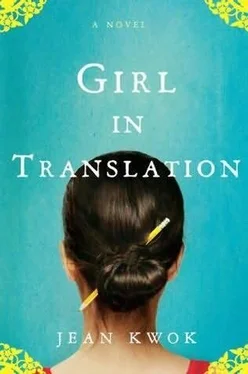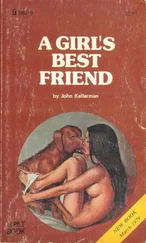
Jean Kwok
Girl in Translation
© 2010
For Erwin, Stefan and Milan, and to the memory of my brother Kwan S. Kwok
I was born with a talent. Not for dance, or comedy, or anything so delightful. I’ve always had a knack for school. Everything that was taught there, I could learn: quickly and without too much effort. It was as if school were a vast machine and I a cog perfectly formed to fit in it. This is not to say that my education was always easy for me. When Ma and I moved to the U.S., I spoke only a few words of English, and for a very long time, I struggled.
There’s a Chinese saying that the fates are winds that blow through our lives from every angle, urging us along the paths of time. Those who are strong-willed may fight the storm and possibly choose their own road, while the weak must go where they are blown. I say I have not been so much pushed by winds as pulled forward by the force of my decisions. And all the while, I have longed for that which I could not have. At the time when it seemed that everything I’d ever wanted was finally within reach, I made a decision that changed the trajectory of the rest of my life.
From my position outside the window of the bridal shop now, I can see the little girl sitting quietly at the mannequin’s feet, eyes shut, the heavy folds of falling fabric closing her in, and I think, This isn’t the life I wanted for my child. I know how it will go: she already spends all of her time after school at the shop, helping with small tasks like sorting beads; later, she will learn to sew by hand and then on the machines until, finally, she can take over some of the embroidery and finishing work, and then she too will spend her days and weekends bent over the unending yards of fabric. For her, there will be no playing at friends’ houses, no swimming lessons, no summers at the beach, not much of anything at all except for the unrelenting rhythm of the sewing needle.
But then we both look up as her father walks in and after all these years and all that’s passed, my heart stirs like a wounded animal in my chest.
Was I ever as beautiful as she? There are almost no pictures of me as a child. We couldn’t afford a camera. The first snapshot taken of me in the U.S. was a school photo, from the year I came to America. I was eleven. There came a moment later in my life when I wanted to move on, and I ripped this picture up. But instead of discarding the pieces, I tucked them away in an envelope.
Recently, I found that envelope and brushed off the dust. I broke open the seal and touched the torn bits of paper inside: here was the tip of an ear, a part of the jaw. My hair had been cut by my mother, unevenly and too short, parted far to the right and swept over my forehead in a boy’s hairstyle. The word PROOF covers much of my face and a part of my blue polyester shirt. We hadn’t been able to pay for the actual photo, so we’d kept this sample they’d sent home.
But when I join the ripped pieces of the photo and put together the puzzle, my eyes still gaze directly at the camera, their hope and ambition clear to all who care to look. If only I’d known.
A sheet of melting ice lay over the concrete. I watched my rubber boots closely, the way the toes slid on the ice, the way the heels splintered it. Ice was something I had known only in the form of small pieces in red bean drinks. This ice was wild ice, ice that defied streets and buildings.
“We are so lucky that a spot in one of Mr. N.’s buildings opened up,” Aunt Paula had said as we drove to our new neighborhood. “You will have to fix it up, of course, but real estate in New York is so expensive! This is very cheap for what you’re getting.”
I could hardly sit still in the car and kept twisting my head, looking for skyscrapers. I didn’t find any. I longed to see the New York I had heard about in school: Min-hat-ton, glistening department stores, and most of all, the Liberty Goddess, standing proud in New York Harbor. As we drove, the highways turned into impossibly broad avenues, stretching out into the distance. The buildings became dirtier, with broken windows and English writing spray-painted over the walls. We made a few more turns, passing people who were waiting in a long line, despite the early hour, and then Uncle Bob parked next to a three-story building with a boarded-up storefront. I thought he was stopping to make a pickup of some sort, but then everyone had gotten out of the car onto the icy pavement.
The people in line were waiting to go into the doorway to our right, with a sign that said “Department of Social Services.” I wasn’t sure what that was. Almost everyone was black. I’d never seen black people before, and a woman near the front, whom I could observe most clearly, had skin as dark as coal and gold beads gleaming in her cloudlike hair. Despite the frayed coat she wore, she was breathtaking. Some people were dressed in regular clothes but some looked exhausted and unkempt, with glazed eyes and unwashed hair.
“Don’t stare,” Aunt Paula hissed at me. “You might attract their attention.”
I turned around and the adults had already unloaded our few possessions, which were now piled by the boarded-up storefront. We had three tweed suitcases, Ma’s violin case, a few bulky packages wrapped in brown paper, and a broom. There was a large wet spot at the bottom of the front door.
“What is that, Ma?”
She bent close and peered at it.
“Don’t touch that,” Uncle Bob said from behind us. “It’s pee.”
We both sprang backward.
Aunt Paula laid a gloved hand on our shoulders. “Don’t worry,” she said, although I didn’t find her expression reassuring. She looked uncomfortable and a bit embarrassed. “The people in your apartment moved out recently so I haven’t had a chance to look at it yet, but remember, if there are any problems, we will fix them. Together. Because we are family.”
Ma sighed and put her hand on top of Aunt Paula’s. “Good.”
“And I have a surprise for you. Here.” Aunt Paula went to the car and took out a cardboard box with a few items in it: a digital radio alarm clock, a few sheets and a small black-and-white television.
“Thank you,” Ma said.
“No, no,” Aunt Paula replied. “Now we have to go. We’re already late for the factory.”
I heard them drive away and Ma struggled with the keys in front of the looming door. When she finally cracked the door open, the weight of it seemed to resist her until finally it gaped wide to reveal a bare lightbulb glowing like a tooth in its black mouth. The air smelled dank and filled with dust.
“Ma,” I whispered, “is it safe?”
“Aunt Paula wouldn’t send us anywhere unsafe,” she said, but her low voice was laced with a thread of doubt. Although Ma’s Cantonese was usually very clear, the sound of her country roots grew more pronounced when she was nervous. “Give me the broom.”
While I brought our things inside the narrow entryway, Ma started up the stairs first, wielding the broom.
“Stay here and keep the door open,” she said. I knew that was so I could run for help.
My pulse pounded in my throat as I watched her climb the wooden stairs. They had been worn by years of use and each step warped, slanting sharply downward to the banister. I worried that a step would give way and Ma would fall through. When she turned the corner on the landing, I lost sight of her and I could only hear the stairs creaking one by one. I scanned our luggage to see if there was anything I could use as a weapon. I would scream and then run upstairs to help her. Images of the tough kids at my old school in Hong Kong flashed through my mind: Fat Boy Wong and Tall Guy Lam. Why wasn’t I big like them? There was some scuffling upstairs, a door clicked open and a few floorboards groaned. Was that Ma or someone else? I strained my ears, listening for a gasp or a thud. There was silence.
Читать дальше













